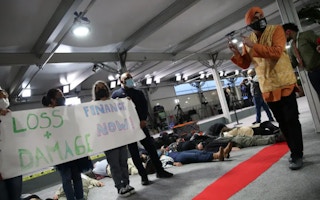The commitments finalised at the recently-concluded landmark climate summit are too little and too late to protect vulnerable communities already living with the impacts of the climate crisis, said delegates and observers at COP26.
While some progress was made at the Glasgow summit on ambition to reduce greenhouse gas emissions, advocates for greater climate action argued that critical financial support for developing and vulnerable states was lost in the final hours of negotiations.
“The 1.5 degrees Celcius target leaves Glasgow battered, bruised, but alive,” said Frank Bainimarama, prime minister of the island state of Fiji, when asked to comment on the decision text delivered at the conclusion of the summit on Saturday.
Small island nations and developing countries battled intensely for two weeks to secure commitments to phase out the use of fossil fuels, as well as for the financing for loss and damage — the irreversible harm caused by climate change — and for adaptation and mitigation.
While draft decisions held some promise for meeting these goals, delegates eventually accepted ‘in the spirit of compromise’ a decision to “phase down” — rather than “phase out” — unabated coal power, and supported a reversal on a clear plan for a loss and damage funding facility.
Broken trust
United Nations secretary-general Antonio Guterres said the summit did not achieve key goals on putting a price on carbon or ending fossil fuel subsidies, and neither did it deliver on the promise of providing US$100 billion a year in climate finance for developing countries.
“
Loss and damage is now on the political agenda in a way it had never been before, and the only way out is for it to be eventually delivered.
Mohamed Adow, director, Nairobi-based thinktank Power Shift Africa
However, he said that there were “building blocks for progress” in the final text. This will help in “reaffirming resolve” to limit global warming to 1.5 degrees Celsius, to boost climate finance for adaptation and is a recognition of the need to strengthen loss and damage support for vulnerable countries, Guterres said.
“Protecting countries from climate disaster is not charity. It is solidarity and enlightened self-interest,” Guterres said. “We have another climate crisis today. A climate of mistrust is enveloping our globe. Climate action can help rebuild trust and restore credibility.”
At the summit, small island states called for support for communities already living with sea level rises and loss and damage.
Saleemul Huq, director of the Bangladesh-based International Centre for Climate Change and Developmen said that a proposal for the creation of a Glasgow loss and damage facility was submitted by 138 developing countries representing five billion people.
Vulnerable and developing countries were “deeply frustrated” that reference to this facility was deleted from the final text, said Saleemul Huq. He believes that the United Kingdom, who is leading the COP presidency, was “bullied” into the compromise.
Mohamed Adow, director of Nairobi-based thinktank Power Shift Africa, said it was disappointing that climate-vulnerable countries had “nothing to show” for their hard work. “But loss and damage is now on the political agenda in a way it has never been before, and the only way out is for it to be eventually delivered,” he added.
“We are leaving empty-handed but morally stronger and hopeful that we can sustain the momentum in the coming year to deliver meaningful support. This will allow vulnerable [countries] to deal with the irreversible impacts of climate change created by the polluting world who are failing to take responsibility,” he said.
COP president Alok Sharma was similarly frustrated over changes in the final wording of the decision text, in relation to the phase-out of coal. He was tearful as he apologised for the way the process had unfolded.
There were finger-pointing at India for the watered-down language. But Brandon Wu, director of policy and campaigns at non-profit ActionAid USA, said that blaming India overlooked issues of equity.
“The problem is not India; the problem is the United States and rich countries refusing to couch fossil fuel phase-out in the context of global equity,” Wu said.
He said that an equitable phase-out of fossil fuels would place “most of the burden squarely on the US and rich countries”.
The Maldives’ environment minister Shauna Aminath said that COP26 had served as yet another conversation that left their homes on the line, while those who had options decided how quickly they wanted to act.
“We have heard that the technology is available. We know trillions are spent on fossil fuels,” Aminath said.
“So we know that this is not about the lack of either of them. We have 98 months to halve global emissions. The difference between 1.5°C and 2°C is a death sentence for us.”
This article was originally published on SciDev.Net. Read the original article.










